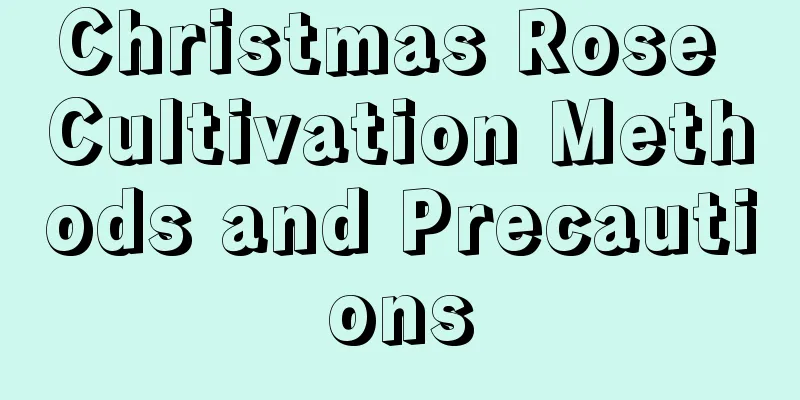Christmas Rose Cultivation Methods and Precautions

1. Maintenance methods1. Soil: Christmas rose is not easy to grow. Poor and acidic soil is not suitable for its growth. It is only suitable for growing in moist alkaline soil with rich humus. 2. Water: This is a plant that likes moisture. After planting, it needs to be watered properly so that it can fully absorb water and grow healthily. Water should be added in time in the later stage of growth, and there should be enough moisture in the soil. 3. Nutrients: Generally, you can use organic fertilizer after planting and dissolve it in water. When watering, pour water into the soil so that it can absorb more nutrients from the soil and grow better. 4. Light: It can only grow in an environment with diffuse light. It cannot grow in an environment with sufficient light, as it will damage its own branches, so it needs appropriate shade. 2. Breeding techniques1. Pruning: When the plant is growing vigorously, the middle and short shoots should be pruned in time. Because the plant is small, if it is not pruned in time, the roots will bear a lot of weight, affecting the quality of the fruit and causing the fruit to fall and the branches to break. 2. Reproduction: Generally, rhizome propagation is chosen. Select strong rhizomes, plant them in soil with sufficient nutrients, and then sprinkle water to make the soil moist. The growing period of Christmas rose is long, so you need to be patient and care for it. Root propagation is faster than seed propagation, and it will generally bloom one year after planting. 3. Problem diagnosis and treatment1. Chafer: Chafer is a common insect pest after planting. To prevent and control the chafer, you need to dilute permethrin with water before and after flowering, and spray it evenly on the branches and leaves to achieve the control effect. 2. Root rot: Although it likes moist soil, too much water during watering will cause root rot. Especially during the rainy season, it is even more important to drain and eliminate waterlogging in time to avoid root rot. IV. Other issues1. How to spend the winter: When winter comes, you should water it once and apply some organic fertilizer appropriately, so as to ensure its nutrient absorption and enhance its anti-freeze ability. 2. Is it poisonous: This is a poisonous plant. Both the juice and the roots are poisonous. Try not to touch it. Take protective measures when pruning and maintaining the skin to prevent children and pets from accidentally ingesting the skin without washing their hands. |
<<: Cultivation methods and precautions of blue sage
>>: Pomegranate cultivation methods and precautions
Recommend
How to grow aloe vera more vigorously
1. Watering In order to make aloe vera grow more ...
How many pounds of ginger is produced per mu
Ginger yield per mu Generally speaking, ginger ca...
Disease and Pest Control of Rhododendron australis
Main diseases Leaf swell There are three main dis...
When and how to prune plum blossoms, how to deal with the wounds after pruning plum blossoms
1. Pruning time The time for pruning plum blossom...
How to propagate Dragon Blood Orchid and what to pay attention to
How to reproduce Dragon Blood Orchid The main way...
What crops are suitable for growing on clay soil?
What crops are suitable for growing on clay soil?...
How to deal with waterlogging and root rot? How long does it take for waterlogging in the soil to cause root rot?
1. Causes of waterlogging and root rot 1. Water a...
Why I advise you not to plant hibiscus flowers Why I can't grow hibiscus at home
Can I grow hibiscus at home? Hibiscus is a sun-lo...
How to cultivate Guanyin bamboo to make it more vigorous
Guanyin Bamboo Growth Conditions Guanyin bamboo l...
The main value of sunflower
Plant Introduction It is a plant of the Malvaceae...
What soil is best for growing orchids (detailed explanation of preparation method)
1. Flower soil requirements 1. Loose: The soil fo...
How to pinch the tips of carnations
Pinching carnations according to their growth sta...
Does bougainvillea bloom in winter? How to manage it after flowering
1. Does it bloom in winter? Bougainvillea blooms ...
How to grow money tree to make it grow well and lush? Cultivation and cultivation methods of money tree
Money tree is a relatively easy plant to grow. It...
The growing environment and local conditions of Dalbergia
Dalbergia growth environment and conditions Dalbe...









